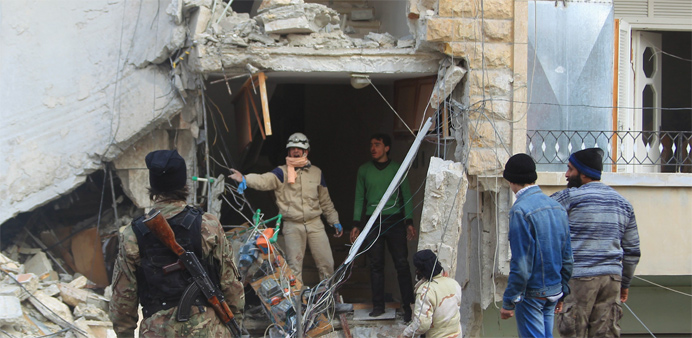Reuters/Beirut
Air strikes believed to have been carried out by Russian warplanes killed scores of people in the centre of the rebel-held city of Idlib in northwest Syria on Sunday, rescue workers and residents said.
They said at least six strikes had hit a busy market place in the heart of the city, several government buildings and residential areas. Rescue workers said they had confirmed 43 dead but that at least 30 more bodies had been retrieved that had still to be identified.
‘There are a lot of corpses under the rubble,’ Yasser Hammo, a civil defence worker, said via an Internet messaging system, adding that volunteers and civil defence workers were still pulling bodies out.
Footage on social media and the pro-opposition Orient TV station showed makeshift ambulances rushing with injured civilians through an area where people were searching for survivors among the debris of collapsed buildings.
One local resident, Sameh al-Muazin, said he had seen mangled bodies in the main Jalaa street of the city, adding that people feared a further round of intensive bombing.
‘Everyone is afraid that this is just the beginning,’ he said.
Russia began a major aerial campaign on Sept. 30 in support of Syrian President Bashar al-Assad, its ally, who earlier in the year had suffered a series of setbacks including the loss of Idlib province and areas near the coast which are of crucial strategic importance.
Moscow says its targets Islamic State militants but rebels and residents say they are causing hundreds of civilian casualties through indiscriminate bombing of areas well away from the frontlines.
Residents say they distinguish Russian planes that fly at high altitudes in sorties from Syrian helicopters that mainly drop indiscriminate barrel bombs at much lower heights.
A coalition of Islamist rebels took Idlib city, the capital of a northwestern province of the same name, earlier this year. It had previously been largely spared by the Russian warplanes.
Idlib was part of a United Nations-brokered ceasefire deal reached in September by warring parties. This allowed for the eventual withdrawal of rebel fighters holed up in a border village near Lebanon in return for the evacuation of civilians from two Shia villages under rebel siege in Idlib province.
Under the deal there was a tacit understanding it fell under the ceasefire arrangements.
Idlib has attracted thousands of ordinary Syrians displaced by the fighting in areas in northern Syria and has also become the centre for a local administration run by Islamist insurgents.

